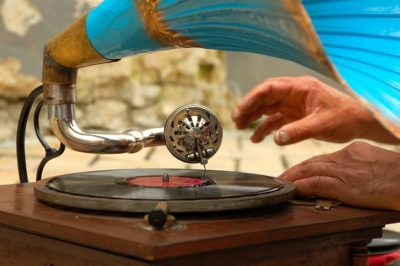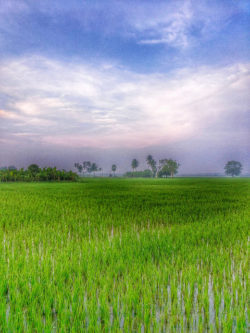by Bakul Banerjee
It was a sunny day in June. Only three months before, as a new bride, I had emigrated from India to join my husband in Baltimore. That day, my next door neighbour, Mary, offered to take me to the local public library. Clad in my modest sari and sporting a yard-long braid, I must have been a strange sight to the all-white patrons there. However, I was also awe-struck. It was hard to believe that I could borrow as many books as I wished and keep them for a month.
Mary also took me to the huge music section in that library. Racks were filled with LPs categorized by genre. I saw some familiar names on the covers. In India, I attended the Indian Institute of Technology, Kanpur. Thanks to the strong American influence at that institution, many students possessed popular LPs. They played Beatles, Elvis, Dylan and others at the informal gatherings. That was when I fell in love with these musicians, particularly those with gritty voices. I always made sure to read the cover and liner notes that were left around.
In my childhood, my limited knowledge of European classical music came from Channel B of All-India Radio that played classical European music late in the evening. My parents had an old-fashioned radio. They turned it on once in a while to listen to selected Bengali music programs although my father enjoyed Beethoven and Mozart occasionally. My parents were convinced that we might get distracted from our studies if the music was on always.
I remembered my first transistor radio, a significant investment that I made, after moving to Madras (now Chennai). I won a national research fellowship at the Ramanujan Institute for Advanced Studies in Mathematics. I had my own dorm room. Other female students, mostly in undergraduate programs, spoke Tamil or Telugu that I could not understand. To drown out their conversations, I would turn on my radio to play catchy Bollywood songs in Hindi. Although I had no access to the Bengali music that I grew up listening, those Hindi film songs brought many hours of joy to my dreary academic existence.
At our home in Baltimore, a stereo system – an expensive one as my husband had explained – sat silently in our living room. A handful of Bengali music LPs stood upright on the shelf. Records of songs by Rabindranath Tagore, ubiquitous in every Bengali home, were absent. My husband frowned upon playing anything other than the Bengali songs from the 60s that he owned. But he rarely listened to them.
At the library, the first LP cover that I noticed was one with a black and beige picture of a black man with Paul Robeson written on it. ‘In America, if you get a chance, listen to the music of Paul Robeson,’ my father told me before I left for the US. With Mary’s help, I got a library card and borrowed the Robeson LP. However, I didn’t exactly know how to turn on the stereo at home. I didn’t dare to ask my husband who firmly believed that listening to American music or reading American novels would lead to character degeneration. I hid the LP as soon as I got home and asked Mary to show me how to work with her stereo system.
My marriage was arranged, but my love for mathematics was not. Soon after my arrival, I applied to and was accepted to the PhD program at the Johns Hopkins University with necessary tuition waivers and a regular fellowship. While waiting for the autumn semester to begin, I spent days practising time-consuming Indian cooking. My challenge was to be able to cook a large amount of food quickly so that I would have enough time to study and commute to school.
Three days after Mary showed me how to operate her record player, I read the instructional manual of our system when my husband was at work. Then, I turned on the stereo system with great trepidation with the Robeson record on the platter. As I fiddled with the knobs, I was startled by Robeson’s booming voice, a kind of voice I had never heard before, coming out of the speakers. That eternal song about Mississippi reminded me of the rivers Ganga and Brahmaputra. I remembered giants of Indian folk music, like Bhupen Hajarika, who mirrored the lonesome yet all-pervasive songs sung by boatmen around the world. I kept replaying the record, occasionally returning to the task of cooking in between. When I had had enough of the music for the day, I hid the record away in the suitcase I brought from India.
During my next visit to the library, I borrowed Puccini’s Turandot, the Italian opera, at random. Except for the text on the cover and what Mary told me about it, I had no clue about the content. I did not know anything about the libretto I could have borrowed. Still, in the emptiness of the living room, I understood the earnest pleading of the Persian prince Calaf and the cold, repeated, rejections of the Chinese princess, Turandot.
Soon, I started school, ending my flirtations with music. Within a year, I learned to drive, but it took me a while to grow confident enough to be able to pay attention to the radio while negotiating the car through the maze of Baltimore traffic. After graduate school and the birth of my two children, I followed my husband to a remote Southern Ohio town. I managed to find a job too. It called for a long, uncomplicated drive following semi-rural roads. I thought I would have a chance to listen to more music at last. However, the small town library had only a limited collection of classical or operatic music. Records or cassettes by black musicians were equally rare. Country music was the queen in area radio stations. I could take songs about love and broken hearts only so much. The stereo system remained silent.
After moving to Chicago in the eighties, I started enjoying live Bengali music programs at the events organized by the local Bengali association. However, between working and raising children, I rarely got around to nurturing my eclectic musical taste. I did attend every possible classical and Jazz concert and recital at the music conservatory of Wheaton College to enhance the piano and violin education of my children. Learning to appreciate the mathematical structure of a fugue by Bach was the reward. My children listened to all kinds of music in their Walkmans with headphones as a part of their permanent adornments. Occasionally, they would let me listen in. Enya, a favourite of my younger daughter, was easy, but I must admit that it took me years to appreciate Bjork or Radiohead.
In mid-nineties, a friend offered four complimentary corporate tickets to the famed Lyric Opera’s production of La Traviata. Since it would be a nice winter outing to the city, my husband agreed to go. To prepare for this momentous event of attending a live opera, I took a trip to the library to learn about it. Another surprise waited for me there. Not only did I find multiple recordings of the opera, but also an audio cassette containing extended commentary. There was a well-thumbed, annotated libretto too. For the next several weeks, I prepared for the big day. Taking the girls to the opera for the first time seemed to be a big deal. However, their father decided that one hour should be more than enough time to drive to the city from the suburb, park the car, and walk to the opera hall. The girls wore pretty dresses while I was dressed in a silk sari and uncomfortable shoes. Even though we ran to the hall, we were fifteen minutes late. I fumed while waiting outside until the beginning of the next act. Once seated in the premier main floor seats, I was transported to a different world.
I hungered for more. Fortunately, friends continued to give more opera tickets. In the gilded hall, I enjoyed the parade of great operas, La Gioconda, Carmen, Flying Dutchman, Eugene Onegon, Isolde and Tristan and others. My favourite trip was with my first-born who took me to see Aida using her student discount tickets. I also had the good fortune of attending the world premiere of Bel Canto opera in December 2016. Once I met somebody who flew in from Denver for no other reason than to attend the performance of Wagner’s Parsifal, the darkest opera I have seen so far.
After multiple gaps of several years, I have made music a significant part of my life now. Over time, I have tried to retrieve hundreds of Tagore songs that occupied a permanent place in my auditory cortex since childhood. Alas, some of them have been shredded by the moths of forgetfulness. In recent years, good quality Sanskrit hymns and devotional songs by Indian mystics are available in CDs and YouTube. They help me connect to my roots.
Tumbling through the musical landscape of my life that was often sparse, I did gather many grand and unusual experiences. Yet, I never could bring myself to enjoy the Bengali songs of the sixties represented by the LP records standing upright in my first home, as if they were fluttering flags warning against my possible moral downfall.
As Robeson sang in the song, Ol’ Man River, I learned many a sumpin’, but didn’t say nuthin’.






